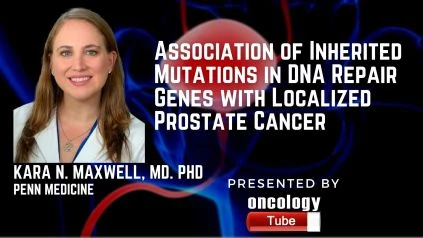Kara N. Maxwell, MD, Ph.D., Assistant Professor of Medicine at Penn Medicine speaks about the Association of Inherited Mutations in DNA Repair Genes with Localized Prostate Cancer.
Link to Article:
https://www.sciencedirect.com/science/article/pii/S0302283821020595
Summary –
Origins:
The discovery of germline mutations in DNA repair genes has major implications for the personalized treatment of prostate cancer patients (PrCa).
Mission:
Determine the genetic testing burden and identify DNA repair genes associated with localized PrCa in a diverse academic biobank.
Participants, setting, and design:
A cross-sectional study of 2391 PrCa patients with localized PrCa was conducted.
Measurement of outcomes and statistical analysis:
In 1588 localized PrCa patients and 3273 cancer-free males, genetic ancestry and mutation rates (excluding somatic interference) in 17 DNA repair genes were examined. Burden testing was carried out between biobank PrCa cases and cancer-free biobank and gnomAD males of genetically determined European (EUR) and African (AFR) ancestry.
Conclusions and limitations:
DNA repair gene mutation rates were lower in AFR persons with localized PrCa than in EUR individuals (1.4 percent vs. 4.0 percent, p = 0.02). Localized PrCa patients had mutation rates that were comparable to biobank and gnomAD controls (EUR: 4.0 percent vs 2.8 percent, p = 0.15, vs 3.1 percent, p = 0.04; AFR: 1.4 percent vs 1.8 percent, p = 0.8, vs 2.1 percent, p = 0.5). Only BRCA2 mutations were significantly enriched in gnomAD controls of EUR ancestry (1.0 percent vs 0.28 percent, p = 0.03), according to gene-based rare variant association testing. 21 percent and 11 percent of the patients fulfilled the high-risk and very-high-risk criteria, respectively, with 3.7 percent and 6.2 percent having any germline genetic mutation and 1.0 percent and 2.5 percent having a BRCA2 mutation. An analysis of a relatively small, single-institution cohort is one of the study’s limitations.
Outcomes:
In an academic biobank cohort of localized PrCa patients, DNA repair gene germline mutation rates are modest, especially among those of AFR genetic origin. Only in high-risk, very-high-risk localized, and node-positive PrCa patients do mutation rates in genes with published evidence of relationship with PrCa reach 2.5 percent. These findings emphasize the significance of risk stratification in patients with localized PrCa in order to identify those who should be tested for germline genetic mutations.
Summary of the patient:
Regardless of race, germline genetic testing is unlikely to detect an inherited DNA repair mutation in the majority of patients who develop localized prostate cancer. A germline DNA repair mutation is more likely if you have high-risk traits.

